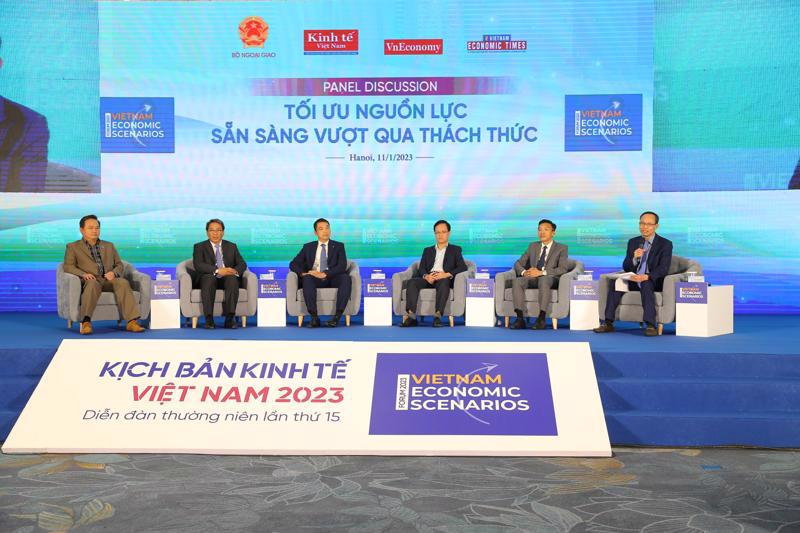The Vietnam Economic Scenario Forum 2023, with the theme “Optimizing resources, overcoming challenges” and held by VnEconomy / Vietnam Economic Times in cooperation with the Ministry of Foreign Affairs (MoFA), began on January 11.
This year’s forum sees the participation of representatives from ministries, sectors, and State agencies, including the Party Central Committee’s Economic Commission, the National Assembly Economic Committee, the Ministry of Planning and Investment, the Ministry of Agriculture and Rural Development, the Ministry of Industry and Trade, the Ministry of Construction, the State Bank of Vietnam, and the Vietnam Chamber of Commerce and Industry.
Addressing the forum on the first day, analysts assessed that Vietnam’s economy achieved many positive results in 2022, such as maintaining sound macro-economic stability in order to post growth of 8.02 per cent, helping the country be among the region’s group of high-growth economies. GDP exceeded $400 billion, while trade turnover stood at $732.5 billion.
Vietnam’s economy will, however, face many challenges in 2023 due to fluctuations and risks, such as the Russia - Ukraine conflict, the global economy losing its growth momentum, the specter of recession, and global growth drivers such as exports, investment, and consumption declining, according to Permanent Deputy Minister of Foreign Affairs Nguyen Minh Vu.
Mr. Nguyen Duc Hien, Deputy Head of the Economic Commission, told the gathering that many international organizations have forecast slowing global growth, from 2.2-2.5 per cent, with many countries and territories and regions at risk of falling into recession. Such impacts will affect Vietnam’s economy, in financial and monetary markets and other areas.
Countries and territories that account for more than 80 per cent of Vietnam’s export turnover, such as the US, South Korea, Japan, the Netherlands, Germany, the UK, and Hong Kong (China), are forecast to experience some degree of economic recession, with Vietnam’s textile and garment industries to be especially affected. Countries and territories that account for more than 80 per cent of its import turnover, meanwhile, such as Japan, South Korea, the US, Malaysia, Taiwan (China), and Indonesia, will also be affected by some degree of recession.
“The first quarter of this year is forecast to be a quarter without positive economic growth figures in the country while the second quarter is likely to continue to be difficult,” said Mr. Nguyen Xuan Thanh, Lecturer in Public Policy at Fulbright University Vietnam.
Similarly, Mr. Nguyen Minh Cuong, Principal Country Economist at the Asian Development Bank (ADB), noted that slowdown in the world’s largest economies is depressing demand for manufactured goods from Vietnam and falling export orders will lead to rising unemployment. And recent momentary tightening, declines in corporate debt insurance, and slow disbursement of public investment have affected Vietnam’s post-pandemic economic recovery.
In order to overcome the challenges, analysts note it is necessary for Vietnam to take advantage of resources, closely analyze and forecast the actual situation, and proactively identify key scenarios and solutions both in the immediate and long terms, to maintain macro-economic stability.
Though there are many difficulties and challenges, there also remain opportunities for Vietnam to change its policy direction. “At the end of May, challenges such as exchange rate pressure will be improved, so it is time for the country to innovate policies and stabilize its macro-economic situation,” according to Mr. Thanh.
Mr. Hien said foreign enterprises accounted for more than 72 per cent of total export turnover and over 50 per cent of the total value of industry. “Vietnam needs to take a more complete approach, optimizing not only human and financial resources but also land resources, institutional conditions, and policies to create new growth in 2023,” he said.
“In strategic competition, we expect public investment and domestic consumption to compensate for any decline in exports, but I must emphasize that it is necessary to disburse FDI along with public investment to see a bright picture,” said Mr. Thanh.
In order to overcome the challenges this year, Vietnam should continue to utilize the advantages it has held in the past. “Vietnam’s has accumulated experience in pandemic prevention, risk management, and crisis handling over the years, which will create space for the country to overcome the difficulties in 2023,” said Mr. Can Van Luc, Chief Economist at the Bank for Investment and Development of Vietnam (BIDV) and President of BIDV Training and Research.









 Google translate
Google translate